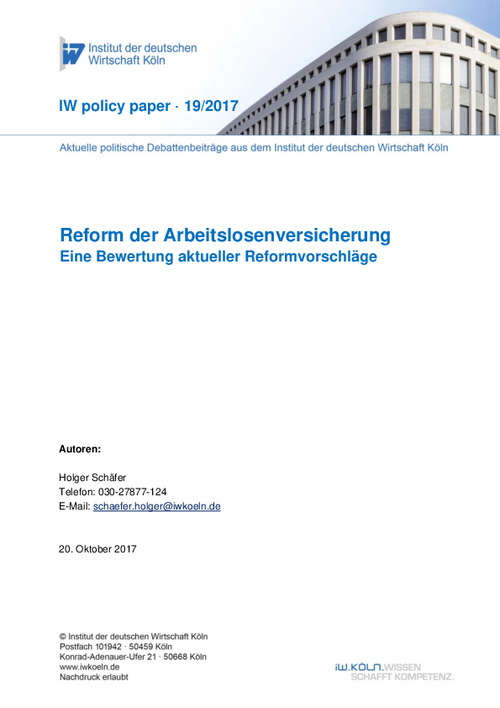The comfortable financial situation for unemployment insurance due to the ongoing good performance of the labour market has recently caused an increase in the number of proposals submitted to expand the range of benefits. Firstly, these proposals aim to ease access to the passive benefits of unemployment insurance by, for example, extending the basic period for receiving benefits and reducing the length of previous employment.

Reform of the German unemployment insurance - An evaluation of current reform proposals
IW policy paper

The comfortable financial situation for unemployment insurance due to the ongoing good performance of the labour market has recently caused an increase in the number of proposals submitted to expand the range of benefits. Firstly, these proposals aim to ease access to the passive benefits of unemployment insurance by, for example, extending the basic period for receiving benefits and reducing the length of previous employment.
Secondly, an elimination of penalties should increase the moral hazard explicitly, while an extension of the period for drawing on benefits should do the same implicitly. Thirdly, "Unemployment benefits Q" and an increase in the range of tasks to include qualification programmes for employed persons should strengthen professional development.
The proposals have one thing in common: they do not have a convincing, underlying justification. A declining usage of unemployment benefits does not correlate with an increase in the usage of basic insurance benefits. It cannot be simply assumed that unemployment insurance will save benefits at the expense of basic insurance. In this regard, there is also no reason to ease access requirements for unemployment benefits. Nor can a problematic situation, which could be used as justification, be cited as a reason for extending the entitlement period. For example, we are not seeing among older people who would benefit from such a reform either an increased dependency on wage replacement benefits or a greater dependency on transfer payments. Rather, the employment rate of older workers is rising at a disproportionately high rate. In the case of professional development, too, it should be hard to ascribe deficient action to unemployment insurance. The demand for more professional development is based on purely normative considerations and cannot be justified empirically.
In addition to the lack of justification for the proposed reforms, it is clear that the proposed measures will have negative consequences. This is most evident in the deliberate increase in the moral hazard, for example through the elimination of penalties. More people will use unemployment insurance benefits for a longer period of time. This also encourages the loss of human capital at an individual level and makes it more difficult to enter the labour market. On a macroeconomic level, there is an increase in the costs to be borne by the community of insured persons. The higher contributions required for this will result in a lower level of employment and higher unemployment.
On the basis of these considerations, it seems necessary to use the financial leeway that unemployment insurance has to reduce contribution rates as soon as the reserve likely to be necessary for handling an economic crisis has been built up. Moreover, if professional development is to be strengthened, the regulations of SGB II [Social Security Code Book II] offer a much more productive field of activity than unemployment insurance. The budget that the job centres have for labour market policy measures is not only significantly lower than that of the employment agencies, it is also falling further in terms of a per capita analysis. At the same time, this segment is likely to have significantly more unemployed persons who have qualification deficits and whose chances of integration can be substantially improved by professional development.
The comfortable financial situation for unemployment insurance due to the ongoing good performance of the labour market has recently caused an increase in the number of proposals submitted to expand the range of benefits. Firstly, these proposals aim to ease access to the passive benefits of unemployment insurance by, for example, extending the basic period for receiving benefits and reducing the length of previous employment. Secondly, an elimination of penalties should increase the moral hazard explicitly, while an extension of the period for drawing on benefits should do the same implicitly. Thirdly, "Unemployment benefits Q" and an increase in the range of tasks to include qualification programmes for employed persons should strengthen professional development.
The proposals have one thing in common: they do not have a convincing, underlying justification. A declining usage of unemployment benefits does not correlate with an increase in the usage of basic insurance benefits. It cannot be simply assumed that unemployment insurance will save benefits at the expense of basic insurance. In this regard, there is also no reason to ease access requirements for unemployment benefits. Nor can a problematic situation, which could be used as justification, be cited as a reason for extending the entitlement period. For example, we are not seeing among older people who would benefit from such a reform either an increased dependency on wage replacement benefits or a greater dependency on transfer payments. Rather, the employment rate of older workers is rising at a disproportionately high rate. In the case of professional development, too, it should be hard to ascribe deficient action to unemployment insurance. The demand for more professional development is based on purely normative considerations and cannot be justified empirically.
In addition to the lack of justification for the proposed reforms, it is clear that the proposed measures will have negative consequences. This is most evident in the deliberate increase in the moral hazard, for example through the elimination of penalties. More people will use unemployment insurance benefits for a longer period of time. This also encourages the loss of human capital at an individual level and makes it more difficult to enter the labour market. On a macroeconomic level, there is an increase in the costs to be borne by the community of insured persons. The higher contributions required for this will result in a lower level of employment and higher unemployment.
On the basis of these considerations, it seems necessary to use the financial leeway that unemployment insurance has to reduce contribution rates as soon as the reserve likely to be necessary for handling an economic crisis has been built up. Moreover, if professional development is to be strengthened, the regulations of SGB II [Social Security Code Book II] offer a much more productive field of activity than unemployment insurance. The budget that the job centres have for labour market policy measures is not only significantly lower than that of the employment agencies, it is also falling further in terms of a per capita analysis. At the same time, this segment is likely to have significantly more unemployed persons who have qualification deficits and whose chances of integration can be substantially improved by professional development.

Holger Schäfer: Reform der Arbeitslosenversicherung – Eine Bewertung aktueller Reformvorschläge
IW policy paper

More on the topic

The Political Economy of Pension Reform
As the German population ages, the country’s statutory pension scheme, which is financed on a pay-as-you-go basis, requires higher and higher contributions while the level of pensions is falling.
IW
Expenditures and Revenues in Germany’s Statutory Health Insurance
Almost annually recurring deficits in Germany’s statutory health insurance system have led to a steady rise in the contribution rate, a percentage of earned income.
IW